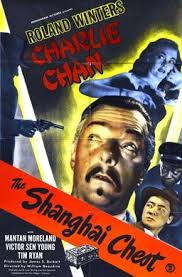
Late at night Judge Wesley Armstrong (Pierre Watkin) is stabbed to death while sitting at the desk in his study. His nephew, Victor Armstrong (John Alvin), happens to come by to see his uncle and is knocked unconscious. The judge’s secretary, Phyllis Powers (Deannie Best), happened to be calling at the time. Not sure what is going on, but believing something is wrong, Phyllis calls the police. Lt. Mark Ruark (Tim Ryan) arrives on the scene. He is let in by Bates (Olaf Hytten), the butler. Ruark finds Victor, who has just come to, standing over his uncle’s body with the knife in his hand. Victor is arrested. The police learn that the judge and Victor were on the outs. Victor wanted to borrow money and the judge refused. The judge called his attorney wanted to change his will disinheriting Victor but he was killed before that could happen. This gives Victor lots of motive.
When the finger print test on the knife comes back there is a surprise. In addition to Victor’s prints are the prints of Tony Pindello. Pindello was a convict who was executed in the gas chamber six months ago. Charlie Chan (Roland Winters) happens to be in the DA’s office when all this unfolds seeking a favor from the DA concerning his son Tommy (Victor Sen Young) and his chauffer Birmingham Brown (Mantan Moreland) in a case of mistaken identity. Chan’s interest is peaked and he asks the DA to let him know if anything else strange comes up about the case.
Not long after that district attorney Frank Bronson (Russell Hicks) is shot in his library. Detective Ruark visits Chan to give him the bad news. He also tells Chan that Pindello’s finger prints were also found in Bronson’s library.
Charlie is now fully involved in the investigation. While investigating, Charlie and Ruark catch the judge's clerk Walter Somervale (Erville Alderson) rummaging through the judge's files. Before he became the judge’s attorney Edward Seward (Tristram Coffin) had been Pindello’s attorney. Seward and the judge had been working on a commission investigating racketeering. The judge also had in his files a letter that hints Pindello may have been innocent. While checking Pindello’s grave Chan and Ruark find that his body is missing. Charlie asks to have anyone connected with Pindello’s trial put in protective custody. Thomas Cartwright (Eddie Coke), one of the jurors, is killed before he can be contacted.
Now with three people dead, with a dead man’s prints all over, and lots of clues Charlie puts together a theory that includes murder, insurance fraud, racketeering and bringing someone back from the dead.
“The Shanghai Chest” was released in 1948 and was directed by William Beaudine. It is the 41st of 44 Charlie Chan films in the 20th Century Fox/Monogram Pictures cannon and the 14th of the Monogram films. It is also the third appearance of Roland Winters as the Chinese detective. Roland took over the part after the death of Sidney Toler in 1947.
The plot to the film is rather involved but clues are doled out throughout the film like Easter eggs. A few red herrings are brought up but quickly dispensed with. Everything is wrapped up at the end but in between a grave is dug up, Charlie breaks into a mortuary as well as a man’s apartment. Victor Sen Yung and Mantan Moreland do their Abbott and Costello routine throughout the film. It’s not the best of the cannon but it’s also not too bad. Like a lot of the Charlie Chan films it’s enjoyable and not too deep. My only question is: Why did they call the movie the Shanghai Chest?

